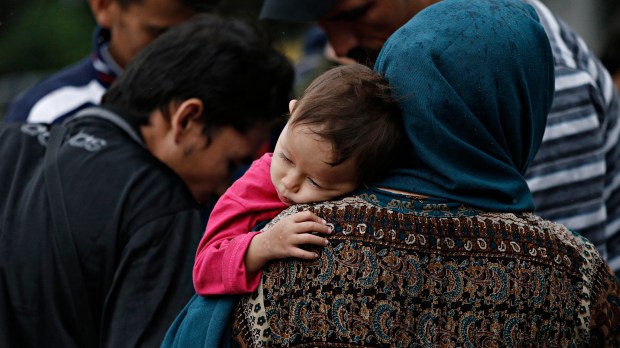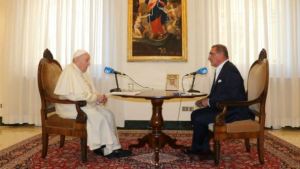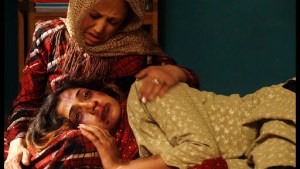The issue of refugees from Afghanistan might seem like a new one for most Americans, as images of desperate Afghans trying to board planes leaving Kabul International Airport before the Taliban takeover were streamed across American television sets. But Afghans have been coming to the U.S. for some time, as Stephen Carattini can attest.
Carattini is President and CEO of Catholic Charities of the Diocese of Arlington, Virginia, which has been helping to resettle Afghan refugees since 2006. Catholic Charities is one of three agencies in Northern Virginia designated by the State Department to help resettle refugees — and one of about 40 Catholic Charities agencies around the country to do such work. Carattini spoke with Aleteia Thursday about that work and prospects for the future as thousands more Afghans make their way to the West in the wake of the U.S. military withdrawal from the country.
Can you give us an overview of the situation with the newcomers from Afghanistan?
We’ve been resettling refugees in one way or another since 1974, when we were incorporated in the diocese here. In the last 15 years, since 2006, the majority of refugees we have been resettling have been from Afghanistan and have been coming to us via the Special Immigrant Visa, or SIV, program. This is a program that was designed and implemented for people who had been working very closely or directly with the United States military or government inside of Afghanistan and were deemed to be in danger if they were to continue to remain in Afghanistan. So they were given the option to apply for this visa program.
Since 2006 we have resettled approximately 4,000 Afghan SIV holders here in Northern Virginia. In the last fiscal year alone, we’ve resettled over 380 Afghan SIVs, and in the last month, 200 came in, during July and August. So the pace of arrivals began to pick up in July and August, for obvious reasons.
Are you seeing more of an uptick now because of the exodus of the U.S. military?
That’s going to be the key question. We know that tens of thousands of people were evacuated in the last three weeks, and they are scattered in multiple places, in third countries and in military bases around the United States. So we know that for example a number of people with SIVs were evacuated, and also a number were not. I think we’re still trying to sort through how many are out and where they are. Then it would be a matter of where they were in the process and when that process will be completed for them to then move on and move to a resettlement agency like ours. There is a lot of uncertainty in terms of the numbers of SIVs.
We understand that a number of people who were evacuated do not have SIV status or were not in the SIV program, and these are people who were evacuated for humanitarian reasons. Maybe they were associated with NGOs or other aid agencies or who might have worked with the United States in some indirect way and whose lives are considered at risk. We’re also waiting to know the final disposition and immigration status for those individuals.
I think we, like every other resettlement agency, are still waiting for some concrete information in terms of the numbers of people we might be expecting.
So up until now you’ve been resettling SIV holders — Afghans who are threatened because the Taliban considers them to have helped America, their adversary — but you might also deal with people who feel threatened for other reasons?
I assume we will, once the government completes the vetting process. They will then make a determination as to who is allowed into the country and what their status will be.
So what exactly does Catholic Charities do to assist these refugees?
This is what we do for every refugee we are given the privilege of resettling. In normal times it starts with meeting them at the airport and being one of the first faces they see when they arrive to their new home. Then it’s very quick. In the first 90 days, typically, our newcomers, our guests, have to be self-sufficient. So the focus is very much on securing housing — permanent housing — and securing employment for them, because within 90 days they’ve got to be financially on their own.
Along the way we want to be providing cultural orientation to them. We want to be getting their children enrolled in schools. There’s paperwork to be completed, social security cards to be applied for, drivers licenses, that sort of thing. Beyond that core group of services in the first 90 days, we’re going to be looking to create mentoring programs for young children and teens. There are options for job and language training. So depending on the English language capability, we’ll be offering additional language training. We’re going to be working with teachers and school administrators on how best to help these newcomers. We need to help them access and navigate the healthcare system, which can be very complicated. Then we’re also able to provide other services, to older refugees, to help reduce the risk of isolation, help them through the immigration and naturalization process.
So the work continues. That type of work can continue for up to five years after they arrive. But the most intense work occurs in those first 90 days.
How many Afghan refugees are you currently working with, and how many do you anticipate processing?
In July and August we resettled 206. That number has slowed considerably because all of the SIVs and people who are in the SIV pipeline are now either in a third country or on a military base somewhere awaiting further processing. The question we’re all awaiting is when and how many SIVs will be processed and moving on to resettlement agencies like ours. Nobody knows yet.
How big of a staff do you have?
We have a newcomer services staff here at Catholic Charities that employs, all told, about 50, but in terms of direct resettlement, about 35 people. That core group of 35 staff members — many of them are former refugees themselves and Afghan SIVs — will be responsible for our resettlement efforts, all of the contractual obligations that we have to the United States Conference of Catholic Bishops.
Do you rely on volunteers to help with any of this?
We ask volunteers to join us. There are mentoring opportunities. People can come in and help us in our job training classes and our language training classes, helping us work with seniors, youth and young adults in terms of helping to bring them together and make sure they can acclimate to their new homes as quickly as possible. People donate sofas and dining room sets. One of our responsibilities is to provide basic furnishings and household items in the apartments when people arrive. So we rely very heavily on the generosity of our community to help us welcome these newcomers.
When we were dealing with refugees from Syria a few years ago, some Americans were concerned that there could be bad actors — terrorists — among them. What steps are taken to screen refugees?
What we do know about the refugees and SIVs that we receive, is that [the screening] is incredibly stringent and strenuous. One of the criticisms of why people couldn’t get out faster from Afghanistan is that the process was taking so long and is so involved. So what might have taken two or three years was taking much, much longer. We’re assured that the United States government vets every refugee, every SIV, and what we understand is that it’s a very thorough process.
I think it’s worth remembering too, in this particular case, that the SIVs were able to apply for the visas because they were already working with the US military and US government departments and organizations in Afghanistan. So the vetting process probably started even then, before they went to work in those organizations.
So I understand the concern but I’m confident in the vetting system that has been in place for years. It’s not easy, for any refugee, and I know it’s been stringent and very exhaustive in the case of the SIV program.
Are there any personal stories of these refugees that you might be able to relate?
What resilience, what courage. It’s not easy to leave your home or your homeland to flee. As I reflect on this, this is very much like Catholics in America. We don’t have to think back too far in our own history here to know what it’s like to have to flee famine or deprivation or war or persecution. And to know what the value of a warm welcome is, and to know the opposite of it as well.
I ask others to reflect on that, particular people of faith. It’s not only part of who we are, it’s part of our own history in this country.
If you speak with refugees they will tell you they are glad and pleased and excited to be in their new country. Relief is often the first and overwhelming sense, but there’s also sadness and sorrow. In this case in particular, because so many are leaving their families and loved ones, their extended families behind. The SIV program applies only to the individual and the immediate family. As you can imagine, coming from a culture and society where the extended family is significant — parents, grandparents, aunts and uncles — people arrive with relief but also sadness and fear for their loved ones left behind. So we have to have a care for that. It’s hard to start over, no matter who you are and where you go. But to also have that anxiety now in particular is quite challenging.
We have staff from Afghanistan who are taking calls from their loved ones asking help in getting out of Afghanistan during the night because of the time difference, and then having to come into work the next day helping to resettle other Afghans who were fortunate enough to get out. You can imagine that can be very emotional. These are our colleagues, so we want to support them and walk with them, to be compassionate and respectful. This is not easy for anybody.
Obviously, most will be Muslim, but are there any Christians among them?
I would presume there were Christians who were able to evacuate. I’m not aware of any and have not personally met any yet. But it’s about our faith, not theirs. We’re called to do this work, to exercise our welcome, our ministry of hospitality to anyone who comes to us in need in our diocese. We have staff who are not Catholic, but I like to think of Catholic Charities as being a place where everyone can express their faith and be united in their desire to serve our brother and sister in need.
Readers interested in helping can find more information at Catholic Charities of Arlington website.



